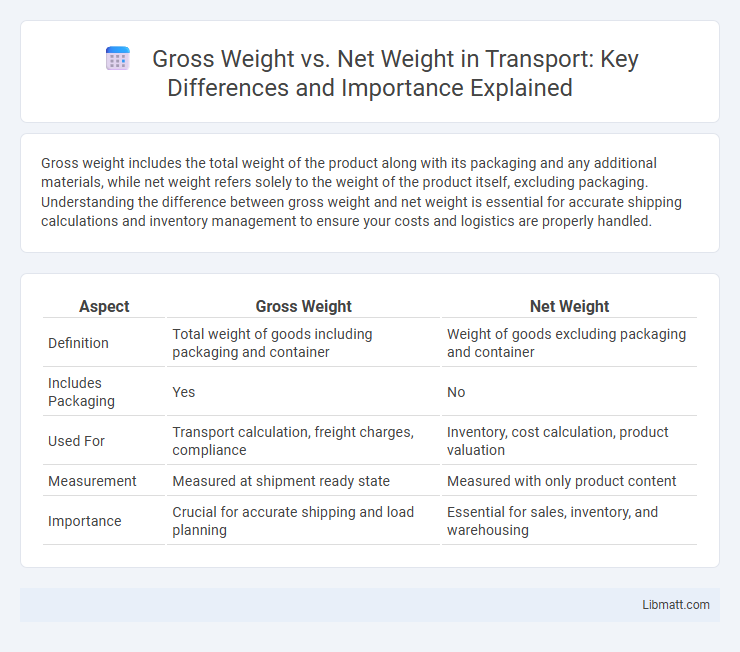Gross weight includes the total weight of the product along with its packaging and any additional materials, while net weight refers solely to the weight of the product itself, excluding packaging. Understanding the difference between gross weight and net weight is essential for accurate shipping calculations and inventory management to ensure your costs and logistics are properly handled.
Table of Comparison
| Aspect | Gross Weight | Net Weight |
|---|---|---|
| Definition | Total weight of goods including packaging and container | Weight of goods excluding packaging and container |
| Includes Packaging | Yes | No |
| Used For | Transport calculation, freight charges, compliance | Inventory, cost calculation, product valuation |
| Measurement | Measured at shipment ready state | Measured with only product content |
| Importance | Crucial for accurate shipping and load planning | Essential for sales, inventory, and warehousing |
Introduction to Gross Weight and Net Weight
Gross weight represents the total weight of a product including its packaging, container, and any additional materials, while net weight refers solely to the weight of the product itself without any packaging. In shipping and logistics, accurately distinguishing between gross weight and net weight is essential for determining shipping costs, regulatory compliance, and inventory management. Understanding the difference between these weights helps businesses optimize storage space and transportation efficiency.
Definition of Gross Weight
Gross weight refers to the total weight of a product including its packaging, container, and any additional materials. It encompasses the net weight of the product itself plus all external packaging components. Understanding gross weight is essential for shipping, logistics, and compliance with transportation regulations to ensure accurate handling and cost calculation.
Definition of Net Weight
Net weight refers to the actual weight of a product excluding any packaging, containers, or additional materials. It represents the true quantity of the item you are purchasing or shipping, providing a precise measurement for inventory and pricing. Understanding net weight ensures accurate comparison and compliance with shipping regulations.
Key Differences Between Gross Weight and Net Weight
Gross weight represents the total weight of a product including its packaging, container, and any additional materials, while net weight denotes only the weight of the product itself excluding any packaging. Understanding the distinction is crucial for logistics, shipping costs, and regulatory compliance as gross weight affects transport requirements and net weight is essential for accurate product pricing and labeling. Shipping labels, customs declarations, and inventory management rely heavily on accurate differentiation between gross and net weight to ensure efficiency and transparency in supply chains.
Importance of Understanding Weight Measurements
Understanding the difference between gross weight and net weight is crucial for accurate shipping, pricing, and inventory management. Gross weight includes the total weight of the product plus its packaging, while net weight refers strictly to the weight of the product itself. Accurate knowledge of these measurements ensures compliance with regulatory standards and prevents costly errors in transportation and sales.
Applications in Shipping and Logistics
Gross weight includes the total weight of cargo, packaging, and containers, playing a crucial role in complying with shipping regulations and determining transportation costs. Net weight refers exclusively to the weight of the actual goods, essential for accurate inventory management and customs declarations. Understanding the difference helps you optimize freight charges and ensure regulatory compliance in shipping and logistics operations.
Gross Weight vs Net Weight in Food Packaging
Gross weight in food packaging includes the total weight of the product along with its packaging, labeling, and any additional materials, ensuring accurate shipping and handling calculations. Net weight represents the weight of only the edible portion, excluding containers or packaging, providing consumers with precise information on the actual food quantity. Understanding the distinction between gross weight and net weight helps you make informed decisions about product value and nutritional content.
Regulatory Standards and Compliance
Regulatory standards for gross weight versus net weight ensure accurate product labeling and transportation safety, with agencies like the FDA and DOT enforcing strict compliance. Gross weight includes the total weight of the product plus packaging, essential for shipping and handling regulations, while net weight reflects only the product's content, critical for consumer protection laws. Non-compliance with these regulations can result in fines, product recalls, and legal actions, emphasizing the importance of precise weight measurement and documentation.
Common Mistakes and How to Avoid Them
Confusing gross weight with net weight often leads to shipping errors and inaccurate inventory records, as gross weight includes the product plus packaging, while net weight refers solely to the product itself. Avoid these mistakes by clearly labeling weights on all documents and double-checking measurements with calibrated scales before shipment. Ensuring your logistics team understands the difference helps prevent costly delays and compliance issues with carriers or customs.
Tips for Accurate Weight Calculation
To achieve accurate weight calculation, always use a calibrated scale to measure both gross weight and net weight precisely. Subtract packaging, containers, and pallets when determining net weight to avoid errors in inventory or shipping. Regularly verify scale accuracy and document weight measurements to maintain consistency and compliance with industry standards.
gross weight vs net weight Infographic

 libmatt.com
libmatt.com